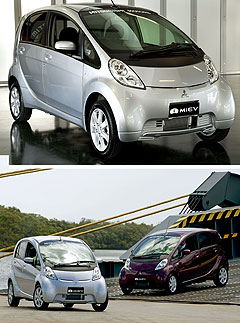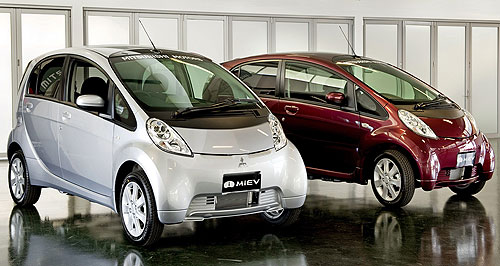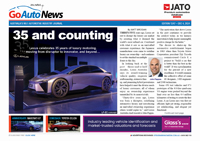Make / Model Search
Future models - Mitsubishi - i-MiEVMitsubishi i-MiEV could cost $70KAt a price: Mitsubishi's electric i-MiEV will cost at least $60,000 in Australia - if you can get one. Admission to Mitsubishi’s exclusive new EV club won’t come cheap30 Mar 2010 MITSUBISHI still expects to be the first car-maker to release an all-electric vehicle in Australia, but has admitted the admission price to its revolutionary i-MiEV will be as high as $70,000. Two Japanese-spec versions of the Australian Design Rule-certified i-MiEV were pressed into service in Brisbane this week, when Mitsubishi Australia kicked off a nation-wide ‘roadshow’ to increase awareness of the new model and the ground-breaking technology it employs. The i-MiEV, which went on sale in Japan in July 2009, was originally due on sale here in late 2009, but strong overseas demand – including a 100,000-vehicle deal with PSA to sell it in Europe with Peugeot and Citroen badges – has delayed its local arrival. An official export program is yet to be signed off for Australia, where a number of environmentally conscious early-adopters have already attempted to put down deposits for the micro-sized city EV. Although the first two examples will be devoted to extended real-world testing by fleet buyers, universities and government departments, GoAuto understands Mitsubishi Australia remains hopeful of securing an ongoing supply of at least five cars a month from some time in the third quarter of this year. Mitsubishi Motors Australia Limited’s vice-president of corporate affairs and human resources Paul Stevenson said the i-MiEV’s initial pricetag in Australia would be in line with its launch pricing in the UK, which was announced last week at £38,699 including VAT (GST) – or about $A63,200. “The car’s going to be expensive at first,” said Mr Stevenson. “They’ve announced pricing in the UK and without their incentive it’s the equivalent of about $65,000. “We image it’s going to be in the same sort of ballpark in Australia – between $60,000 and $70,000. That’s their sort of global price for the car in any case, and it will come down from there.”  Mr Stevenson said the i-MiEV would be more affordable than Toyota’s Prius hybrid by the time Mitsubishi was ready to make it widely available to the public – but he cautioned that wouldn’t occur until global production ramped up. Mr Stevenson said the i-MiEV would be more affordable than Toyota’s Prius hybrid by the time Mitsubishi was ready to make it widely available to the public – but he cautioned that wouldn’t occur until global production ramped up.“By the time we really start pushing towards getting it into the consumer market it will come down into the $30,000 to $40,000 mark. I think that’s when you can really start making a push into consumer sales. “We’re hoping to have the world’s first production EV from a recognised manufacturer in Australia this year, but it is still not actually finalised and we don’t know exactly how far away that will be.” Mr Stevenson drew comparisons between the i-MiEV and plasma TVs to highlight the fact its price will come down as production volume increases and, at least in theory, its lithium-ion battery technology becomes cheaper. “You saw what happened with plasma-screen TVs. The same sort of thing will happen with EVs because the same thing applies to lithium-ion battery cells – that’s what’s driving all the cost in it. “How quickly that cost will come down ... we’re ramping up production facilities, the factory’s doubling in size. At the same time we’re doing that the Americans and French are putting in plants, Panasonic and Nissan are putting in plants. “That’s ramping up capacity but at the same time it could drive up the cost of lithium, so there are too many variables for me to say. “At present all of the constraints on sales are on the supply side, so that’s why we’re fighting for allocation. “There is huge demand this year from Japan and Europe. The PSA alliance with Mitsubishi in Europe will soak up lots of cars. The other issue is how many cars can we sell to early adopters and that’s a bit of an unknown.” Mitsubishi has committed to producing 2000 i-MiEVs in its 2009 fiscal year ending March 31 and will double its initial 2010 build target of 4000 to 8000 this year. As we’ve reported, vehicles will be allocated to markets in priority order, with preference given to markets with the most government incentives. However, Mr Stevenson confirmed the release of the electric version of Mitsubishi’s i-car in Australia was not contingent on the sort of government subsidies that are now common elsewhere. “Yes, it will come regardless of federal, state of local government incentives for EVs,” he said. “MMC has looked at global markets and the first thing they’re looking for is ‘where are the governments really coming out strongly in support of EVs?’. The big announcements have come from Germany, which has come out with (sales) targets for EVs, France, the UK and the US. “It’s not so much putting incentive money in there, it’s making the noise that yes, you’re telling the country that EVs are going to be part of the transport mix, so let’s start getting into it and let’s start dealing with all of the ancillary issues around it. “I guess MMC would look at us – and this is what we’ve been saying to government as well – and say that compared to these other countries we’re lagging. I’m careful of saying that it has to be a dollar incentive – governments can do so much, like announcing a target, having charge point policies on future apartment buildings or office blocks and having dedicated EV transport lanes. “None of those things actually cost the government anything, but they make a bold statement and that’s what we’re on about.” I-MiEVs delivered in the UK after January 1, 2011, when the government’s recently announced Consumer Incentive Scheme will reduce the price by £5,000 ($A8170), will carry a transaction price of £33,699 including VAT ($A55,059). Further reducing the i-MiEV’s purchase and/or running costs in the UK is an exemption from road tax (saving about £300 or $490 a year), a congestion charge exemption (saving up to £2000 or $3268 per annum), a first-year capital expenditure allowances for fleet buyers, zero benefit-in-kind company car tax and free EV parking in a number of areas of London. In addition, Mitsubishi says i-MiEV owners will benefit from a lower rate of VAT for domestic electricity, lower servicing costs and downtime because it comprises only four working parts compared to more than 300 in a typical internal combustion engine and “expected high residual values due to high demand outstripping supply for several years to come”. MMAL said the i-MiEV would likely be available here in a single specification. Like the standard petrol-powered ‘I’ kei-car on which it is based – and for which MMAL failed to establish a viable business case in Australia – the i-MiEV is 450mm shorter, 220mm narrower but substantially higher than Mitsubishi’s own Colt light car, which opens the brand’s local line-up with a starting price of $15,740. “The technology is here, we’ve managed to come up with a product that we can present in the market and that’s about all we can do as a car company,” said Mr Stevenson. “There are all of these other ancillary issues that have to be dealt with and other people are responsible for them – they’re out of our hands. That’s why we’re doing this program – to get government and other stakeholders talking about EVs. “There are still lots of EV sceptics around and that’s understandable. There have been a lot of false starts, but the thing is the technology is here, it’s real and it’s viable. “We hope to get an i-MiEV allocation sooner rather than later – we’re pushing for as soon as possible and we want to be first to market, put it that way.”  Read more14th of December 2009  Mitsubishi delays i-MiEV until mid 2010First mass-made EV put back due to global demand and lack of infrastructure23rd of November 2009  Brits charge ahead with national EV networkUK invests $54m into EV network as first shipment of Mitsubishi i-MiEV cars arrive12th of November 2009  First look: Citroen C-Zero EV breaks coverCitroen uncovers its i-MiEV-based C-Zero EV, which might be sold here from 20119th of September 2009  Plug-in Pug pops up ahead of FrankfurtPeugeot races out its Europe-only iOn EV facsimile of Mitsubishi’s i-MiEV25th of June 2009  Brits give electric cars a $50 million shot in the armBritish government announces funding for real-world EV trials to hasten development13th of April 2009  ADR approval for i-carMitsubishi’s i-MiEV becomes the first mass-production electric car approved for OzAll future models Alfa Romeo Alfa Romeo Abarth Abarth Alpine Alpine Alpina Alpina Audi Audi Aston Martin Aston Martin BMW BMW Bentley Bentley Chery Chery Brabham Brabham Chrysler Chrysler Chevrolet Chevrolet Cupra Cupra Citroen Citroen DS DS Dodge Dodge Fiat Fiat Ferrari Ferrari Foton Foton Ford Ford Great Wall Great Wall FPV FPV Haval Haval GWM GWM Honda Honda Holden Holden Hummer Hummer HSV HSV Infiniti Infiniti Hyundai Hyundai Jaguar Jaguar Isuzu Isuzu Kia Kia Jeep Jeep Land Rover Land Rover Lamborghini Lamborghini Lexus Lexus LDV LDV Mahindra Mahindra Lotus Lotus Mazda Mazda Maserati Maserati Mercedes-AMG Mercedes-AMG McLaren McLaren MG MG Mercedes-Benz Mercedes-Benz Mitsubishi Mitsubishi Mini Mini Opel Opel Nissan Nissan Peugeot Peugeot Pagani Pagani Proton Proton Porsche Porsche Renault Renault Ram Ram Rover Rover Rolls-Royce Rolls-Royce Skoda Skoda Saab Saab SsangYong SsangYong Smart Smart Suzuki Suzuki Subaru Subaru Toyota Toyota Tesla Tesla Volvo VolvoMotor industry news |
Click to shareMitsubishi modelsResearch Mitsubishi All future models Alfa Romeo Alfa Romeo Abarth Abarth Alpine Alpine Alpina Alpina Audi Audi Aston Martin Aston Martin BMW BMW Bentley Bentley Chery Chery Brabham Brabham Chrysler Chrysler Chevrolet Chevrolet Cupra Cupra Citroen Citroen DS DS Dodge Dodge Fiat Fiat Ferrari Ferrari Foton Foton Ford Ford Great Wall Great Wall FPV FPV Haval Haval GWM GWM Honda Honda Holden Holden Hummer Hummer HSV HSV Infiniti Infiniti Hyundai Hyundai Jaguar Jaguar Isuzu Isuzu Kia Kia Jeep Jeep Land Rover Land Rover Lamborghini Lamborghini Lexus Lexus LDV LDV Mahindra Mahindra Lotus Lotus Mazda Mazda Maserati Maserati Mercedes-AMG Mercedes-AMG McLaren McLaren MG MG Mercedes-Benz Mercedes-Benz Mitsubishi Mitsubishi Mini Mini Opel Opel Nissan Nissan Peugeot Peugeot Pagani Pagani Proton Proton Porsche Porsche Renault Renault Ram Ram Rover Rover Rolls-Royce Rolls-Royce Skoda Skoda Saab Saab SsangYong SsangYong Smart Smart Suzuki Suzuki Subaru Subaru Toyota Toyota Tesla Tesla Volvo VolvoMotor industry news |










Facebook Twitter Instagram